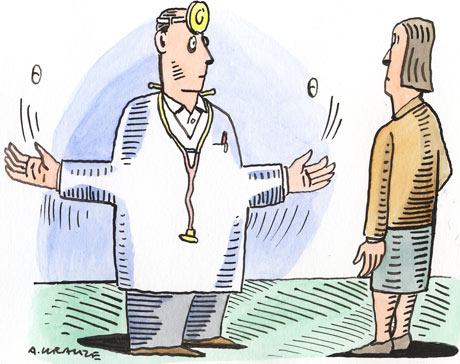
There was very little fanfare when the high court handed down its abortion ruling this week. From a distance the issue looks like an unappealing mix of the technical and the intimate, so nobody wants to talk about it (though nobody really wants to talk about abortion in the first place). In fact it's not complicated in the slightest, and it's only intimate if you are squeamish about the entire concept of medical science.
The early medical abortion (EMA) involves two pills that have to be taken 48 hours apart. The first terminates the pregnancy; the second stimulates a process akin to miscarriage. Currently women have to take Mifepristone at a clinic, return two days later to take Misoprostol, and then go home. The British Pregnancy Advisory Service wants to simplify the process, with the second pill handed over by the clinic when women have the first pill, with instructions on taking it at home.
The BPAS's reasoning is as follows: on a practical level, unless you live near the clinic, you are likely to start having a miscarriage on your way home. It's no way to travel. In almost every other country where EMA is available – from France to Vietnam, America to Sweden – women are entrusted with the second pill when they take the first. Our system is the anomaly, internationally, due to a precise interpretation of one phrase in the Abortion Act, which states that terminations must be carried out in an NHS hospital or clinic approved for the purpose.
It's nitpicking, really, since the terminating drug is the first one, and is administered in a clinic. So the protocol could easily be changed without a change in the law. And in clinical terms, the Royal College of Obstetricians and Gynaecologists updated its guidance and found no medical reason why women couldn't take the pill at home. In the same document, incidentally, it called into question the archaic requirement for two doctors to sign off on an abortion.
Despite this unambiguous support from the royal college, the BPAS lost its case anyway; the court ruled that this was too sensitive a matter for the Department of Health to adjudicate on, and responsibility could only finally be taken by someone with democratic accountability: in other words, the health secretary, Andrew Lansley. As Jennie Bristow, who edits the BPAS's Abortion Review, put it: "How far should it be the jurisdiction of the health secretary to make, or interfere in, matters of clinical practice?" Bristow notes that it's not the role of clinical progress to dictate abortion law – but this was never about changing the law. The BPAS was merely trying to overturn a terrifically inconvenient process.
To give a full picture of how difficult an EMA is at the moment, Darinka Aleksic of Abortion Rights points out that, for women in Wales, there are no abortion clinics outside Cardiff. So a woman, besides having an initial GP consultation, could have to travel for hours on public transport, do the same journey two days later and have a miscarriage on the bus home. Aleksic remarks (with some restraint I think): "This was a real missed opportunity to protect the health and wellbeing of women who've already decided to have an abortion."
Even if we disregard the time people have to take off work or college, and the cost of childcare – even if we assume that everyone has time and money in limitless amounts – women should nevertheless, Aleksic continues, "be able to expect that their treatment is based on best clinical practice, and not driven by an ideological agenda".
The problem is that there clearly is an ideological agenda, on both sides; but in the mainstream discussion about abortion nobody is prepared to articulate it. MPs who are anti-abortion attach themselves to the practical issue of trying to reduce the time limit. MPs who are pro-choice represent themselves as simple realists, who wish it didn't have to happen, but since it does they will fight for it to be legal.
Because there is no open battle and no possibility of any glory, the issue simply slips off the agenda. Any move that could be seen as taking the hassle out of having an abortion is quietly shunted down the governmental to-do list, which is why we still have this absurd process where, in order to get an abortion, you have to find two doctors who will pretend to think that you're mad. A third of all women will have had an abortion by the time they are 45, and every year 70,000 of those are EMAs. That is a very large constituency whose needs are being totally ignored because it is considered more important to pamper the free-floating disapproval of anonymous people who think that this a bad business, and that abortions should be as difficult as possible.
Andrew Lansley, amusingly enough, is on record as being in favour of both home abortions and axing the two-doctor rule: in 2008, he made a speech to that effect while arguing for a reduction in the time limit. He has now been expressly handed the final decision on the abortion pill by the high court. But of course, Lansley is now in government, where cross-party policy on abortion over scores of years has amounted to: "Keep quiet and it might go away."

